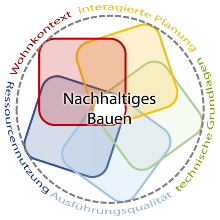Introduction
As a result of the rapid economic development in Vietnam, lifestyles and the needs of residents are changing in new building typologies with materials, constructions, and supply systems that were not previously common. This development is leading to far-reaching problems with structures and building physics, especially under the demanding climatic conditions there, which stand in the way of energy-efficient and sustainable construction. Consequently, the German-Vietnamese project CAMaRSEC is supporting the implementation and further development of energy-efficient, resource-efficient and sustainable construction practices. Based on interdisciplinary problem analysis and fundamental research, effective infrastructures for research, characteristic value determination, training, education and the transfer of scientific results into Vietnamese construction and planning practices are being developed.
State of science and technology
As demands for comfort and convenience change, so too does the indoor climate in the buildings. This is accompanied by the fact that materials are exposed to new climatic indoor conditions, while the outside climate is extremely warm and humid. At present, the materials and building systems used in the Vietnamese construction industry are also changing. For example, unfired bricks such as concrete and cellular concrete blocks are being promoted as a replacement material for the construction of modern residential towers in order to reduce the energy needs and environmental impacts of producing and consuming farmland for clay extraction. However, such new materials require both adapted technologies and processing as well as integration into building and plant engineering building design to work as a permanent and sustainable replacement for the construction methods established in the market. In particular, the moisture properties of new materials is of great importance in this context. Failure of these new building techniques, such as cracks in the plaster or moisture ingress, will bring the new construction practice into disrepute.
At present, there is insufficient knowledge in the Vietnamese construction industry regarding the physical building properties and the ability to use these materials is also lacking.
CAMaRSEC is therefore addressing issues that hamper the effective application of the necessary tools for energy- and resource-efficient construction in Vietnam and, in particular, the successful application of the new national energy code for residential tower construction.
Inspection aspects and project goals
The project is examining the problems from five perspectives, which together illustrate the life cycle context of new residential buildings. This includes the living context, integrated design, technical fundamentals, quality of execution and use of resources.
All these topics are designed to establish an effective governance framework to promote sustainable construction in Vietnam. The current state of affairs is determined by extensive socio-scientific user surveys and engineering audits of the building physics which are done in parallel. The climatic conditions in terms of construction practices and the current construction practices themselves will also be analysed.
Based on this interdisciplinary problem analysis and fundamental research, a central result of the project will be the development of a building physics research infrastructure for scientific materials research and the determination of building material characteristics. Specifically, an implementation plan for a building physics laboratory and an outdoor testing area for material weathering will be created.
This will support the introduction of an advanced engineering regulatory framework for energy-efficient and sustainable construction practices. In addition, skill building measures will be implemented in different phases of the building life cycle.
Contribution to sustainable construction
CAMaRSEC is promoting the effective implementation and further development of construction standards and will thus contribute effectively to energy-efficient, resource-efficient and generally sustainable construction practices in Vietnam.
The project activities are closely linked with plans for building physics test facilities sponsored by the local Ministry of Construction by project partner Vietnamese Institute for Materials, plans from the National University of Civil Engineering and Ton Duc Thang University for the development of study programs for energy-efficient and sustainable building as well as the training of construction workers through the College of Urban Works Construction. CAMaRSEC is also adding to complementary projects of other actors (e.g. UNDP, IFC, GIZ) for the introduction of resource-efficient construction methods and the implementation of the new national energy standard. CAMaRSEC is therefore opening up great potential for far-reaching effects.
The project is making a practice-oriented contribution to the global energy and resource revolution in the construction industry beyond Vietnam into the tropical region with its continuously rapid socio-economic development.
- Funding Measure
-
CLIENT II – International Partnerships for Sustainable Innovations
- Project Title
-
- Promotional Reference
-
01LZ1804A-E
- Funding Period
-
01.07.2019 – 30.06.2022
- Funding Volume of the Joint Project
-
2,126,071.54 €
- Project Partners
-
- University of Hamburg
- Fraunhofer Society for the Promotion of Applied Research e.V., Stuttgart
- TAURUS Instruments AG, Weimar
- BFW Berufsförderwerk BAU Sachsen e.V., Leipzig
- Project Partners in Vietnam
-
- Vietnamese Institut for Building Materials (VIBM), Hanoi
- National University of Civil Engineering (NUCE), Hanoi
- Ton Duc Thang Universität (TDTU), Ho Chi Minh City
- College of Urban Works Construction (CUWC), Hanoi
- Vietnam National Construction Consultants Corporation (VNCC), Hanoi
- Last Update
-
August 2019
Contact

Dr.-Ing. Yuanchen Wang
Academic employee




